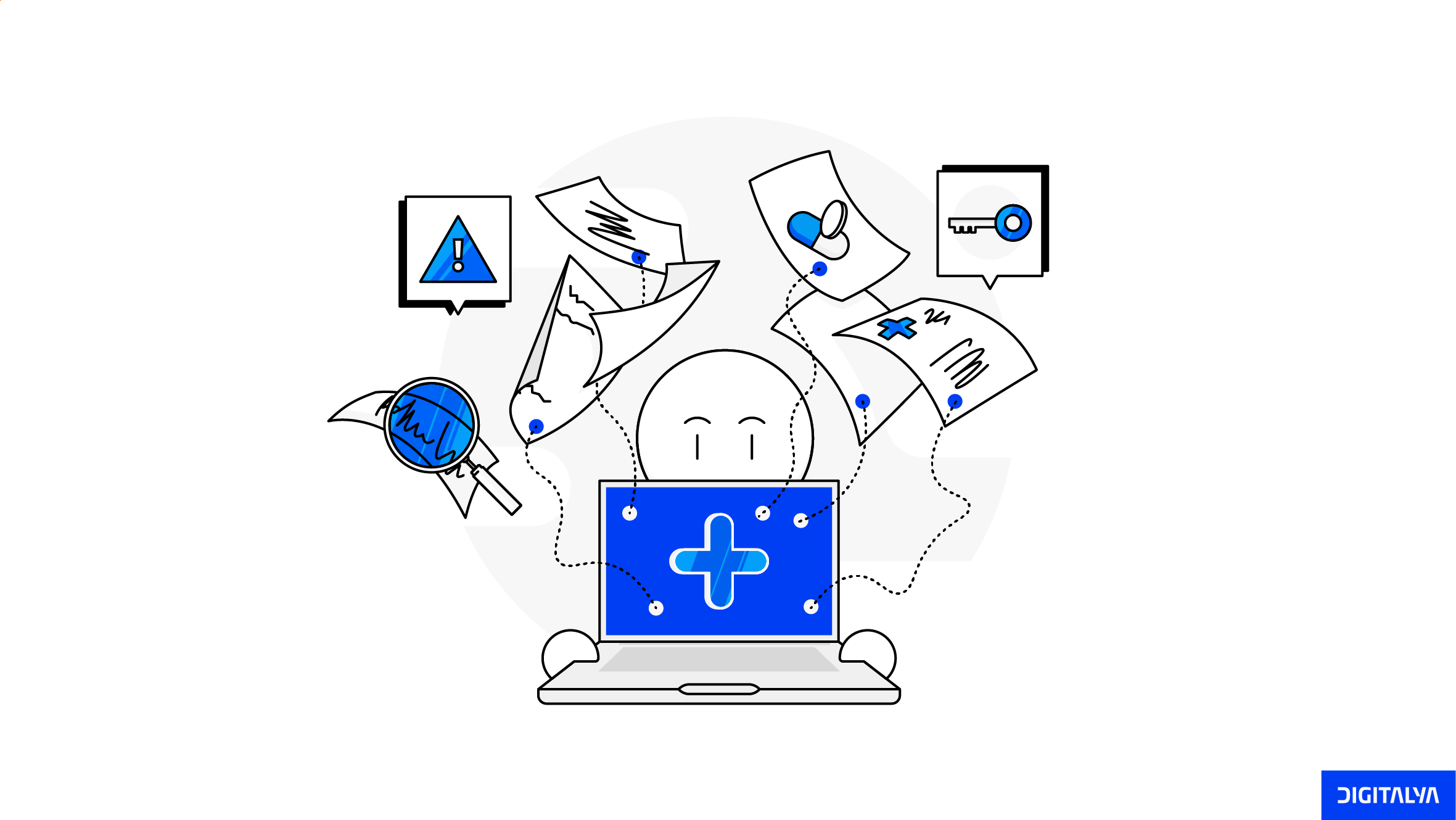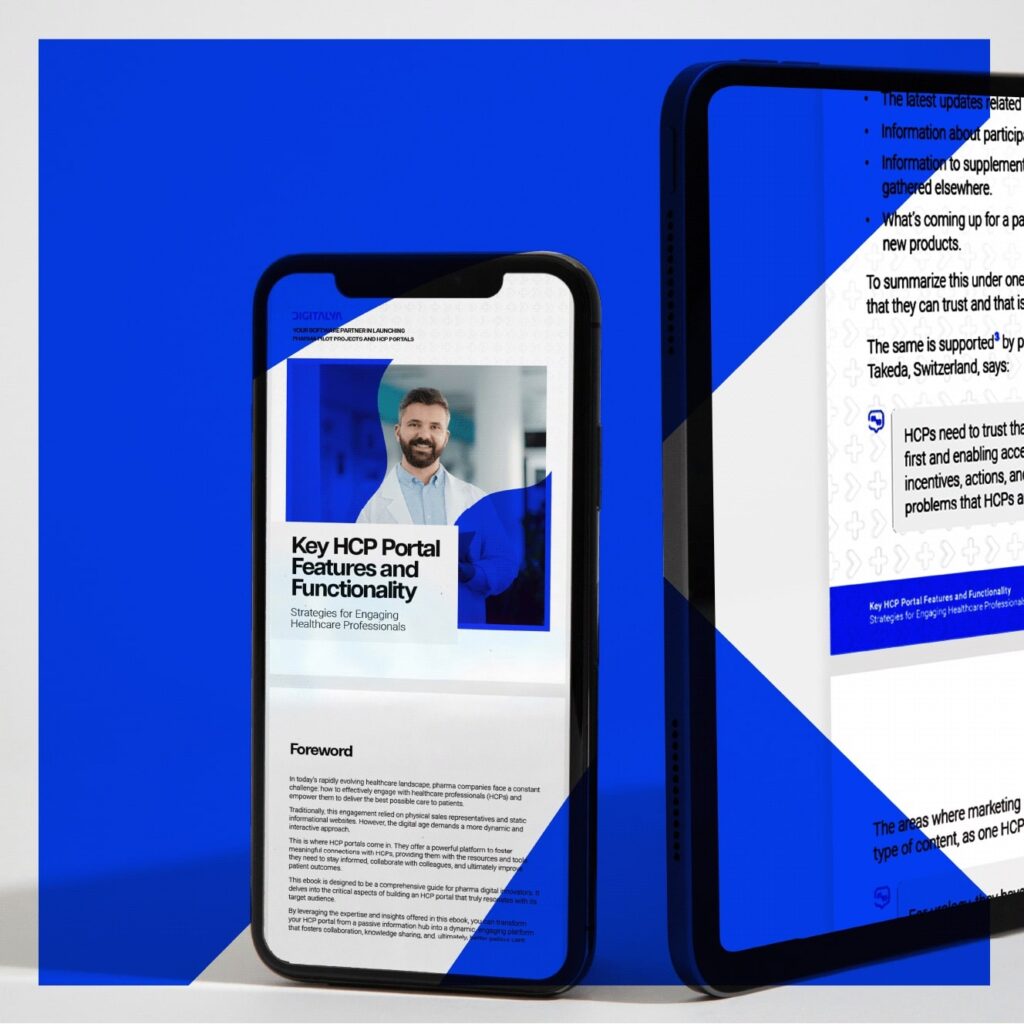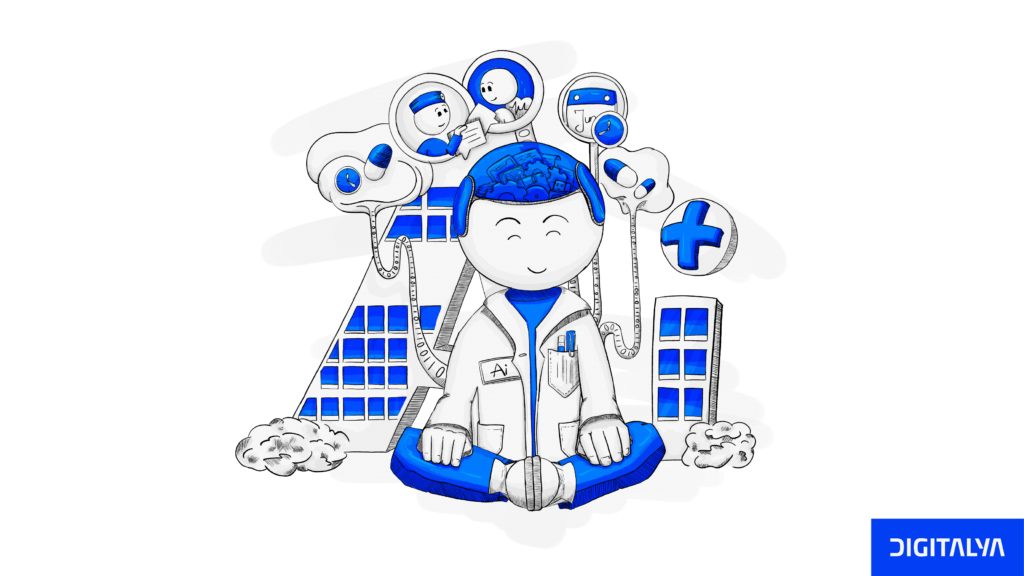The past decade has been about digitization in most sectors and aspects of our lives. There is a digital app for almost everything you can imagine, from grocery shopping to public transportation to health monitoring.
Digital transformation in pharma companies has emerged as a strategic imperative. Digitalized technologies reshape conventional practices. The pharma industry faces a paradigm shift, which paves the way for more efficient, patient-centric, and data-driven approaches.
Naturally, software development stands at the heart of this transformation, serving as the catalyst for innovation and progress. Digital transformation in pharma is a reality that pharmaceutical companies can no longer ignore if they want to keep up with competitors and progress in a larger sense.
There are challenges, though, especially for traditional practices, but they should be regarded as mere obstacles to overpass or opportunities to innovate. We are already used to technological leaps, but lately, we have witnessed an increased pace in how such developments occur and reach markets.
It is difficult for us, as consumers, to stay tuned to every novelty, all the updates and upgrades. You can imagine the pressure on companies, especially large ones with a certain natural inertia.
Needless to say, the pharmaceutical industry is at a crossroads, compelled to embrace digital transformation in pharma companies to stay competitive and relevant. In seeking avenues for innovation, custom software solutions and strategic software development emerge as key drivers in this transformative journey.
1. The need for digital transformation in pharma companies
There is no question about the knowledge and experience that traditional pharma practices have gathered in decades of practice. But, we need to be honest and admit that they are now facing unprecedented challenges and need to accelerate innovation.
The demand for more personalized healthcare, the complexity of managing vast datasets, and the need for streamlined regulatory compliance is a stringent reality in this era where digital transformation is not a luxury but a necessity.
From the business point of view, digital health is on top of the agendas of most executives. According to healthcare research by Accenture, 92% of health executives they interviewed considered it a top strategic priority to deliver highly personalized experiences.
As for investments in digital, a McKinsey study found that in 2022, $10 billion was invested in deals related to tech-healthcare by big tech players. Furthermore, the MedTech segment is rocketing, with hundreds of product launches from January 2019 to May 2022 alone. Pharma needs to keep up with this trend in the healthcare market.
From the consumer point of view, the Accenture research team has found that patients, who are the consumers, expect the same level of technologizing in healthcare, consistent with what’s happening in the non-healthcare sector.
2. The role of software development in digital transformation
The digitization game is about mastering data and interpreting analytics in a way that supports decision-making and drives action. Digital capability is at the core of most activities nowadays.
Digital transformation impacts software development in a way that is more than adopting digital tools and assets. It impacts IT environments and digital processes altogether using cloud-based apps and DevOps strategies, including AI in pharma.
This is why customizing global pharma software to digitally innovate drug discovery, drug development, and performance management, going as far as the pharmaceutical business as a whole, is a challenge itself.
3. Challenges in traditional pharma practices
3.1 Limitations of conventional approaches
The pharmaceutical sector is still devoted to traditional practices. As good as they have proven over time, such practices often bring limitations in scalability and adaptability. With evolving healthcare needs, there’s a growing gap between what conventional systems can offer and what the industry demands.
Take gaps in data management, for example. Due to digital solutions for healthcare data access, the sheer volume and diversity pose significant challenges. Conventional methods struggle to manage, analyze, and derive actionable insights from this wealth of information for clinical development or business results.
Pharmaceutical production and time to market face significant delays when applying conventional approaches. The time itself is not a problem, but the speed with which customers expect to receive what they need has increased greatly. And it becomes a bigger problem when competitors manage to react faster, usually thanks to digitization in their operating model.
3.2 Compliance and regulatory hurdles
The pharmaceutical industry operates in one of the most regulated environments. Meeting compliance standards is intricate, and traditional methods are often inadequate to cope with evolving regulatory landscapes.
Regulatory agencies also need to tune in to the technological transformation in the pharmaceutical sector, as the established regulatory pathways no longer apply to new digital solutions. It is a race to ensure safety and privacy for all players.
4. Digital transformation in pharma companies
4.1 Definition and Scope
Digital transformation in pharma companies involves a comprehensive reconstruction of processes, leveraging digital technologies to enhance manufacturing efficiency and marketing and operational efficiency to improve patient outcomes and drive innovation. It integrates technologies like artificial intelligence (AI), machine learning, data analytics, and custom software solutions.
The scope of digital transformation for pharma companies is to equip and empower cross-functional teams who can perform autonomously and at a high level to reach overall goals, going beyond product-focused KPIs.
Digital transformation in pharma companies also allows more intent toward customer experience strategy, built around various digital experiences for all stakeholders – from pharma representatives and physicians to patients as “end-users.”
4.2 Key Components of Digital Transformation
To undergo such changes, it is not sufficient for pharma companies to adopt digital tools, equip pharma representatives with tablets, or enable online shopping. It is an entire process encompassing different areas along the value chain and across departments. here are a few main components that need to be integrated to increase digital capability in pharmaceutical companies.
Data Integration: Health data are increasingly numerous and readily available for translation into health solutions. Besides permission and regulatory compliance for data access, all companies need a system to collect and bind together all the scattered sources. Digital solutions should have, at their core breaking down silos and integrating data from various sources for a holistic view.
Advanced Analytics: Once relevant data from those separate sources is gathered and organized, you need a strong tool to make sense of them. Advanced data analysis, AI, and machine learning lead to predictive modeling and anticipation of market trends, which supports informed decision-making and business development.
Custom Software Solutions: Customizing global pharma software is key to meeting specific needs in the same market or in different regions, each with its own characteristics. Custom pharma web development solutions such as HCP portals and omnichannel tools allow you to engage closer with your target customers, improve customer experience, and drive more sales.
4.3 Benefits for Pharma Companies
We’ve already given away how digitization transformations enable pharmaceutical companies to positively impact the future of health. Considering the effort required to overcome inertia and traditional operations, it’s only natural to look for strong advantages that justify the investment to innovate digitally.
Enhanced Efficiency: Think of how much time and focus you save when paying a bill online or even through automatic payment options in your online banking app. Now, think of how many other activities you can accomplish just by having this digital solution at hand.
Now, scale to a pharma company or a manufacturing organization. Streamlining processes through digital tools improves manufacturing and supply chain management, time to market, and operational efficiency in general.
Patient-Centric Approaches: Digital transformation enables more personalized and patient-centric healthcare delivery. Why is it beneficial for pharma companies?
Because personalized approaches lead to better patient outcomes, which translates into more satisfied customers who return to your brand and refer it to others, it is beneficial for the brand image and business results.
Innovation and Research Acceleration: Advanced technologies like AI and machine learning accelerate innovation, research, and development. Digital RD is not a futuristic scenario but already occurs across the pharma industry. It is a competitive advantage not to be ignored.
5. Role of software development in revolutionizing healthcare
As every medical condition has its own protocol and line of treatment, so has digital transformation in pharma, its “recipe” and string of processes, at the core of which is software development.
Different companies function differently and provide different health solutions. Therefore, they need to use various digital channels to power change in those areas where they need improvement.
5.1 Custom software solutions
Tailored software solutions, such as HCP portals and custom omnichannel tools, are the answer to ensuring the most efficient approach for the company’s specificities and its market. A healthcare development company is a good solution to have custom software created for specific pharma requirements.
Such custom solutions streamline internal processes and enhance communication and collaboration. We now live in a world where hybrid working has become the norm, and most employees expect to be able to do their jobs remotely.
It is a fact that needs to be seriously taken into consideration and integrated into the organization’s employer strategy. Custom software solutions can very well make remote work possible and efficient at the same time.
5.2 Data analytics and artificial intelligence
Big data is the new gold rush. Digitization allows immense volumes of data to be collected, stored, and made available (within legal and ethical boundaries, of course). Healthcare relies so much on understanding patterns and behaviors, on predicting so we can prevent and treat them efficiently.
The COVID-19 pandemic stands as the most recent example. How organizations understand and use that data can be a game changer. It is not enough to collect or access information. You need the tools and know-how to make correlations, understand what they mean, and tell you about people, causality, effects, and the future. Harnessing the power of data analytics and artificial intelligence revolutionizes decision-making.
Predictive modeling, data-driven insights, and AI-driven diagnostics transform how healthcare professionals approach patient care. All this is possible through software being developed to do just so.
5.3 Telemedicine and remote patient monitoring
Just like remote working has become the norm, remote patient monitoring and consultations have gained much terrain within medicine and healthcare services. But this wouldn’t be possible without software being developed to connect devices, enable distance communication and data transfer, as well as analysis and interpretation.
Software development facilitates the implementation of telemedicine solutions, enabling remote consultations and monitoring through smart devices, which, naturally, also work based on software. This not only improves patient access to care but also enhances the efficiency of healthcare delivery.
6. Challenges and risks in implementing healthcare software
No important transformation goes completely without risks and obstacles. Challenges and opportunities are to be found in any change process. The output depends on how aware you are of them and what measures you take to overcome barriers, prepare for risks, and seize opportunities. Let’s see the main issues that need attention in pharma’s digital transformation.
6.1 Security concerns
There is no need to stress how valuable health data is. Organizations operating with such data must be aware of malevolent entities who would go to any lengths to obtain and use that data for their own purposes.
As the healthcare industry embraces digital solutions, the risk of cyber threats increases. At the same time, you cannot digitize without collecting and operating with such data.
Completely avoiding cyber threats by not dealing with data of interest is not an option. Robust cybersecurity measures are possible and imperative to safeguard sensitive patient data.
6.2 Interoperability Issues
One of digital transformation‘s main features and benefits is connecting different operational areas to communicate better, gain time, reduce costs, and, most importantly, deliver better quality pharma products and services.
The interoperability of various systems is a great opportunity and a common challenge. Ensuring seamless communication and data exchange between different software solutions is crucial for an integrated healthcare ecosystem.
Once you know the challenge, you can foresee what needs to be done to overcome the difficulties of connecting various digital systems and solutions.
6.3 Staff training and adoption challenges
The tech part is challenging, but the greatest challenge may come at the end of the digital transformation process. People must learn, adapt, and use the new tech tools efficiently. Introducing new software solutions requires a cultural shift and comprehensive training programs.
Resistance to change and unfamiliarity with new technologies can hinder successful implementation. However, it can be overcome with consistent communication, persistence, attention to people’s needs and fears, and custom training.
7. Conclusion
The future of software development in shaping the pharmaceutical industry is one of immense promise and opportunity. The positive impact on healthcare delivery is evident as digital transformation becomes more ingrained.
For leaders and decision-makers in healthcare or pharma, investing in strategic software development and embracing custom solutions is not just a business decision; it’s a commitment to revolutionizing healthcare for the better.
Whether you decide on insourcing vs outsourcing pharmaceutical software development, it is important that your business steps further into a digitized world. In the competitive landscape of the pharmaceutical industry, those who harness the power of digital transformation through innovative software solutions will undoubtedly lead the way in delivering impactful, patient-centric, and efficient healthcare services.






